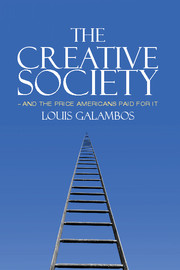Book contents
- Frontmatter
- Contents
- Preface
- 1 1931
- 2 Life, Death, and Learning in the Cities
- 3 Toward a New Economy, 1890 to 1930
- 4 State Crafting – American Style
- 5 Confronting the World
- 6 Winners and Losers, 1890 to 1930
- 7 New Deal Experiments
- 8 Fighting On God’s Side
- 9 The New Aristocracy, 1946 to 1969
- 10 The Suburban Conquest of the 1960s
- 11 Empire in the American Century
- 12 The Tattered Empire of the 1970s
- 13 The Cracked Core
- 14 The American Solution, 1981 to 2001
- 15 Conservatism: Rhetoric and Realities, 1981 to 2001
- 16 The Hegemony Trap
- 17 The American Dream, 1981 to 2001
- 18 The Creative Society in Danger
- Acknowledgments
- Index
- References
12 - The Tattered Empire of the 1970s
Published online by Cambridge University Press: 05 June 2012
- Frontmatter
- Contents
- Preface
- 1 1931
- 2 Life, Death, and Learning in the Cities
- 3 Toward a New Economy, 1890 to 1930
- 4 State Crafting – American Style
- 5 Confronting the World
- 6 Winners and Losers, 1890 to 1930
- 7 New Deal Experiments
- 8 Fighting On God’s Side
- 9 The New Aristocracy, 1946 to 1969
- 10 The Suburban Conquest of the 1960s
- 11 Empire in the American Century
- 12 The Tattered Empire of the 1970s
- 13 The Cracked Core
- 14 The American Solution, 1981 to 2001
- 15 Conservatism: Rhetoric and Realities, 1981 to 2001
- 16 The Hegemony Trap
- 17 The American Dream, 1981 to 2001
- 18 The Creative Society in Danger
- Acknowledgments
- Index
- References
Summary
After Nixon and Agnew took office in 1969, the victory of the American suburbs and the suburban mentality seemed complete. But the long-standing struggle between the realists and the idealists over the nation's empire had yet to be resolved. The resolution for many in this generation of Americans would be achieved amid a great internal struggle that would array youth against age, professional expertise against common sense, and the powerful advocates of empire against those who were deeply concerned about the erosion of American democratic values. By the end of the 1970s, many who treasured memories of fighting on God's side in World War II would realize that they – like the scientist Robert Oppenheimer – had “known sin.”
By that time, the American Century was collapsing like a tire with a slow leak. The leak should have been obvious to many Americans, to most of their leaders, and to all of the experts who now played decisive roles in framing the country's foreign policies and military interventions. It should have been clear to Walt Whitman Rostow, President Johnson's advisor on national security issues, that the U.S. position in the world had been sagging since the mid-1960s. But the smoke screen of overweening pride made it difficult for the well-educated, talented experts to see what was happening. After all, the pundits of the new American aristocracy – the corporate and military leaders, the economists and other academics, the policy experts like Rostow, and the organizational wizards like McNamara – had reason to believe they had fought off or bought off their critics in the Civil Rights and New Left movements. Their optimism was not entirely irrational. But they were wrong.
- Type
- Chapter
- Information
- The Creative Society – and the Price Americans Paid for It , pp. 183 - 201Publisher: Cambridge University PressPrint publication year: 2011

